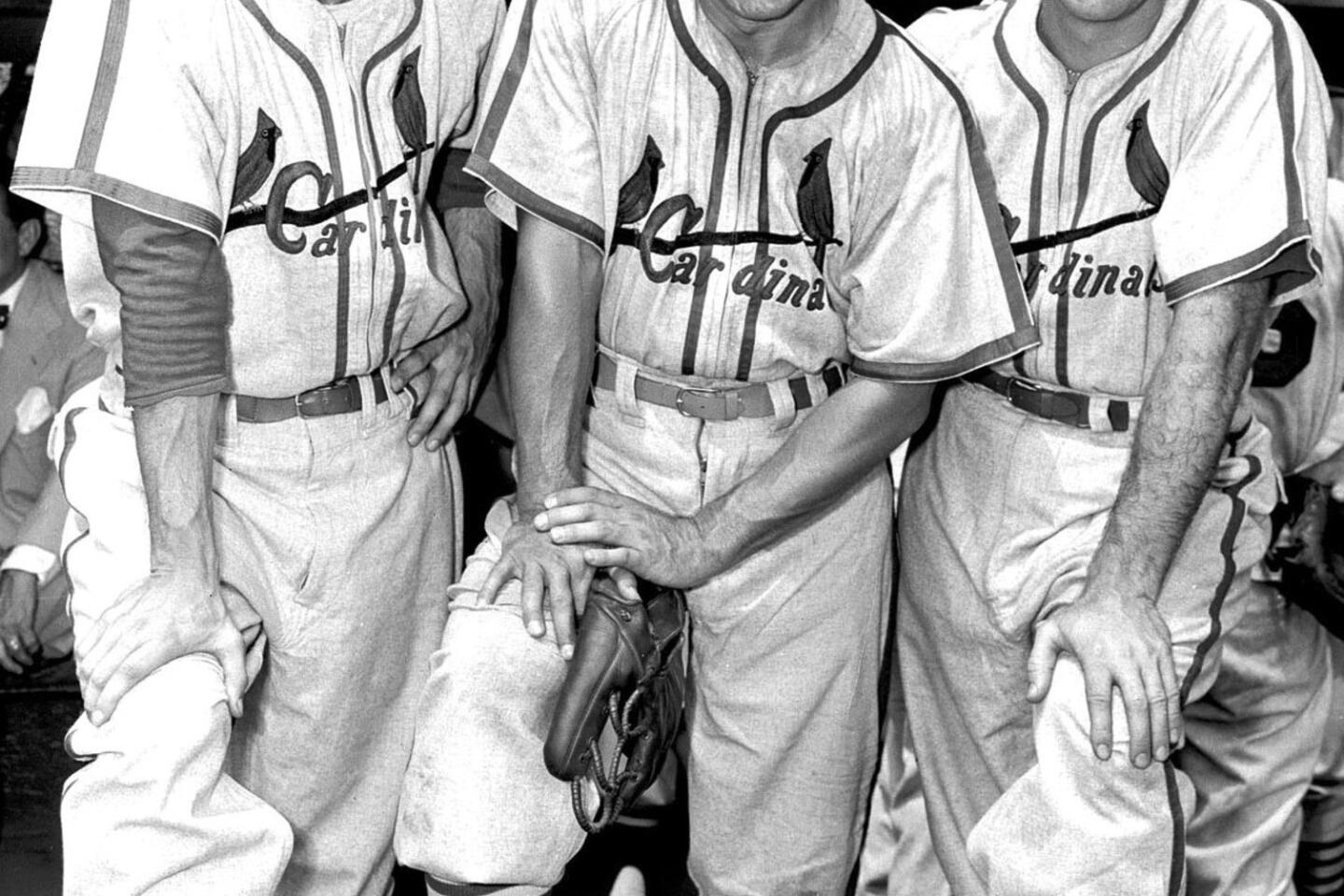Stan Musial dies at 92; Cardinals’ Hall of Fame hitter
To generations of baseball fans, he was simply “Stan the Man.”
Stan Musial, a legendary slugger for the St. Louis Cardinals who came to embody one of the sport’s most successful franchises, died Saturday. He was 92.
Musial, who had Alzheimer’s disease, died at his home in the St. Louis suburb of Ladue, the Cardinals announced.
During his 22 seasons, all with the Cardinals, Musial won seven National League batting titles and three most valuable player awards. A career .331 hitter, he was inducted into the Hall of Fame in 1969, becoming only the fourth player chosen in his first year of eligibility.
“Stan Musial was the greatest player in Cardinals history and one of the best players in the history of baseball,” William DeWitt Jr., the Cardinals’ chairman, said Saturday in a statement.
Musial’s nickname was inspired by Brooklyn Dodger fans who marveled at his mastery of the Dodgers at Ebbets Field and complained, “Here comes the man again.”
Don Newcombe, a star pitcher for the Dodgers, told Sports Illustrated in 2010: “I could have rolled the ball up there against Musial, and he would have pulled out a golf club and hit it out.”
Stanley Frank Musial was born Nov. 21, 1920, in Donora, Pa., to Lukasz and Mary Lancos Musial, the fifth of their six children.
In high school, Musial was a two-sport star. He could have played college basketball on scholarship but signed with the Cardinals as a pitcher in 1938.
He was so wild in Williamson, W.Va., the lowest level of the Cardinals’ minor league system, that his manager suggested he be released. But another player’s injury gave him a chance to play outfield, and he saved his career by hitting .352. The next season in Daytona Beach, Fla., Musial hurt his left shoulder diving for a ball in center field, ending his pitching career.
“My arm never did get better,” he told the St. Louis Post-Dispatch in 2002. “I couldn’t throw hard from then on. But it never bothered my hitting.”
In 1941, he reached the majors despite starting the season on a lowly minor league team in Springfield, Mo. He hit .426 in 12 games late in the season for St. Louis, and the Cardinals finished second to the Dodgers. Musial had a remarkable season, hitting a combined .364 after jumping through the St. Louis minor league system. “Facing oblivion in the spring, he reached stardom,” according to the 2001 book “Musial: From Stash to Stan the Man.”
With Musial in the lineup beginning in 1942, the Cardinals reached the World Series in three consecutive seasons, winning in 1942 and 1944.
“The ’42 Cardinal club was the best I was with. If the war hadn’t come along, I feel we could have won maybe six or seven pennants in a row,” St. Louis outfielder Terry Moore said in the 1994 book “Stan the Man Musial: Born to Be a Ballplayer.”
In 1943, Musial won his first batting title and MVP award when the Cardinals lost the series to the New York Yankees.
Musial said he “memorized the speed at which every pitcher in the league threw his fastball, curve and slider. Then I’d pick up the speed and rotation of the ball in the first 30 feet of its flight and knew how it would move once it approached the plate.”
Leo Durocher, who faced Musial as a player and manager, once said the only way to pitch him was “under the plate.”
Musial’s signature feature was a distinct batting stance that Chicago White Sox pitcher Ted Lyons once said made him look like “a kid peeking around the corner to see if the cops are coming.” Former St. Louis Manager Whitey Herzog had told Musial, “I tried to have your stance and I was in the minors for eight years.”
After spending 1945 in the Navy, Musial again led the Cardinals to the World Series in 1946, when they defeated the Boston Red Sox in seven games. Musial and Red Sox star Ted Williams struggled in the series, each hitting only .222. It was Musial’s last World Series.
His best season may have been 1948, when he was named the league’s most valuable player for the third time. Healthy after having appendicitis in 1947, Musial led the league in almost every offensive category, including his .376 batting average and 131 runs batted in. He just missed winning the triple crown with 39 home runs, one short of the league lead.
He hit five home runs during a doubleheader in 1954 and reached a career milestone in 1958 with his 3,000th hit.
Musial retired after the 1963 season and spent a year as the Cardinals’ general manager. He remained a celebrity in St. Louis, running Stan Musial & Biggie’s Restaurant, which he opened in 1949.
At baseball’s 2009 All-Star game in St. Louis, Musial received a standing ovation when he was driven onto the field before the game. He handed a ball to President Obama, who threw out the ceremonial first pitch.
When Musial received the Presidential Medal of Freedom, the nation’s highest civilian honor, in 2011, Obama noted that “his brilliance could come in blinding bursts” and said he “remains to this day an icon, untarnished … a gentleman you’d want your kids to emulate.”
Musial’s wife of 72 years, Lillian, died in May. He is survived by their son, Richard; daughters, Gerry Ashley, Janet Schwarze and Jean Edmonds; 11 grandchildren; and 12 great-grandchildren.
“He had greatness and warmth and affection and appreciation,” sportscaster Bob Costas, whose career started in St. Louis, told Scripps Howard News Service in 2003. “But there wasn’t a specific thing for people to hang their hat on — other than those who really followed him and saw him play.... All he was was incredibly good for an incredibly long time and an unbelievably nice guy.”
Thursby is a former Times staff writer.








